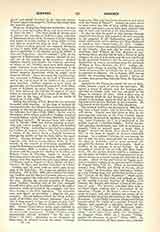

Goetz, MARIE JOSEPHINE, second superior-general of the Society of the Sacred Heart, daughter of Joseph Goetz of Strasburg and Marie Anne Wagner; b. March 7, 1817; d. January 4, 1874; her parents dying early, her education was left to the care of an aunt who sent her to school at the Convent of the Sacred Heart, Besancon. At first her silent, observant, and distant attitude showed that she felt herself out of tune with her surroundings, but in the second year she threw herself into school life and carried all before her in lessons and play. At the age of seventeen she entered the novitiate of the Sacred Heart at Montet and took her first vows in 1837. In 1842 she was entrusted with the charge of the school at Besancon, which was going through a difficult phase. Her judicious management showed what might be expected of her in the future, and immediately after profession in 1847 she was appointed mistress of novices at Conflans. She continued in this charge, to which was afterwards added the government of the house as superior, until 1864, when she was named vicar-general. The failing strength of the foundress made it necessary for her to have some one at hand, to whom she could communicate her views for the future. She found a full understanding of them in Mother Josephine Goetz, who was elected superior-general in 1865 after the death of Blessed Madeleine Sophie Barat.
Mother Goetz governed as superior-general for nine years. Her work was principally one of consolidation and development of what had been established or projected by the foundress. She established a training school at Conflans to prepare the young religious for their duties as teachers, and entrusted to a small committee the revision and adaptation of the curriculum of studies to the growing needs of the order. During the Franco-Prussian war and the time of the siege and Commune in Paris, Reverend Mother Goetz was obliged to withdraw to Laval that communications with her religious might not be cut off. She employed the enforced leisure of those months in collating and revising the summaries of decrees and decisions of the general congregations of the Society of the Sacred Heart. Reverend Mother Goetz made visitations of the houses then existing in Europe, as far as time and health permitted—but her strength rapidly failed and she died from a stroke of paralysis, after a few days’ illness. The marking features of her personality were breadth of view and rapid intuition that appeared unerring as an instinct, directness of intention and strength of purpose which lay concealed under a timid exterior, but astonished by their force when circumstances called for prompt decision and action—and a characteristic grace of humility which seemed to be her distinguishing supernatural gift.
J. STUART

